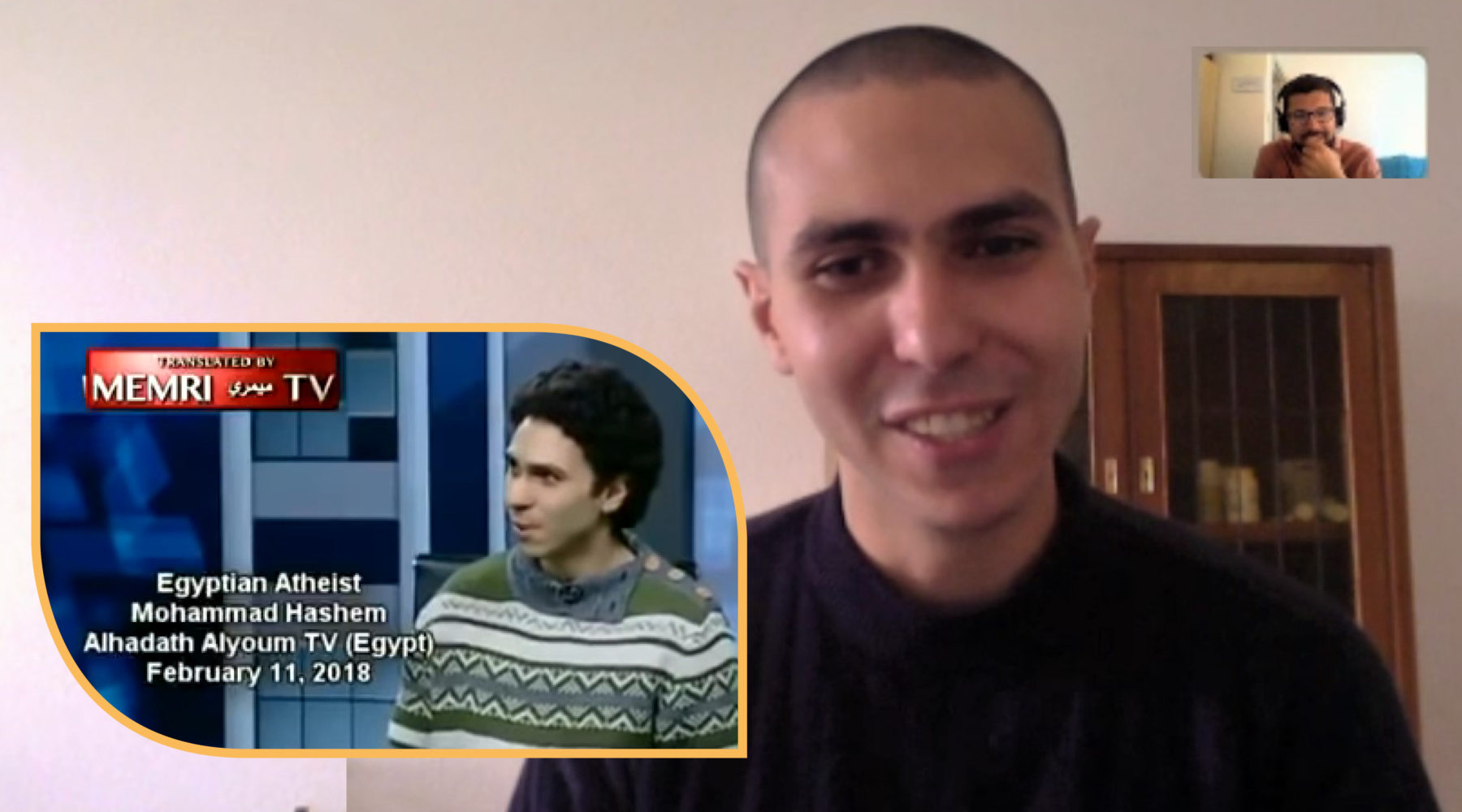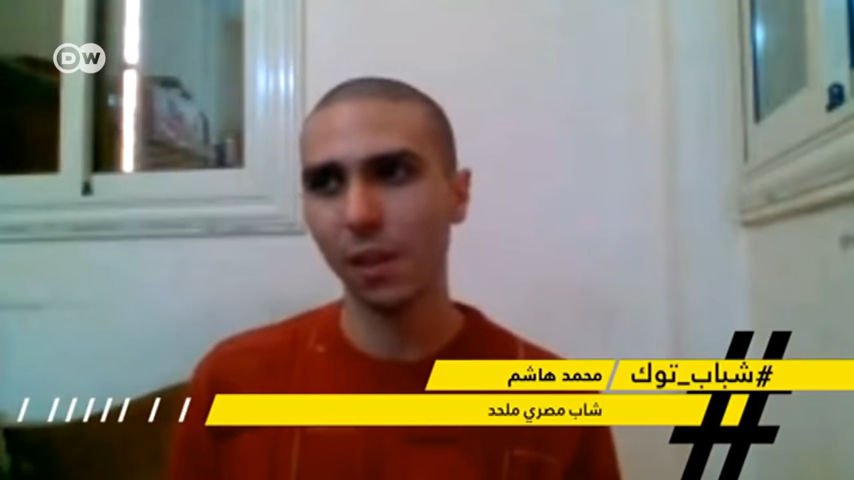
Do you remember Mohamed, the Egyptian atheist kicked off a TV interview?
Mohamed made it safely to Europe in May. Now, we've held a fresh interview with him. And this time he's allowed to finish what he has to say!

Mohamed made it safely to Europe in May. Now, we've held a fresh interview with him. And this time he's allowed to finish what he has to say!
Back in February 2018 the face of Mohamed Hisham went viral online. Referred to as “atheist berated on live TV”, Mohamed was kicked off the TV show because he said that he didn’t believe in God. After that appearance, his life change dramatically.
A year and a half later we invited to Mohamed to give a new interview, and this time he’s allowed to speak without being cut short or thrown out…
The clip of an atheist being condemned and kicked out of an interview for talking about atheism – the very subject he’d been invited to discuss – went viral in 2018. The protagonist, Mohamed Hisham, would later tell us that it was such a “traumatic experience” that he watched the video only once after that day, and never wanted to watch it again.
It was 11 February 2018. Mohamed was invited to a TV show called “Egyptian Street” to discuss his atheism with an Imam. But there was no real “discussion” at all. Mohamed had barely the time to say that he didn’t believe in God when the host interrupted him and started to rail against him, inviting him to see a psychiatrist and kicking him off the show.
One year later, during our interview, Mohamed finds the charity to forgive the behaviour of the host:
“I would like to excuse the host, because the situation was like that his audience would have thought: “Why would you give to this atheist a platform? This means that you are as guilty as him.” That could have had very bad consequences for him, like it happened to another Egyptian host who had hosted a gay person and ended up in jail for this.”
Yes, in jail, because the persecution against minorities in Egypt is so extreme that acknowledging their existence can be interpreted by conservative authorities as normalization and therefore support and therefore an offence. Mohamed, who is both atheist and gay, for 26 years had to hide both identities. But on 11 February 2018 he decided to come out of the closet with his atheism – coming out as both together would probably have earned an even worse backlash.
Watch the video of our new interview with Mohamed Hisham below, conducted by Humanists International’s Giovanni Gaetani.
Why did Mohamed decide to speak up, even knowing it could jeopardise his own life? His reply is a testimony to his courage and strength of will:
“At first I hoped that somebody would volunteer to go, but unfortunately nobody wanted to, because it’s like a suicide mission. You are going to experience a lot of troubles, losing your family, losing your job, getting into legal troubles, travel ban, physical assaults, etc. All of that was on the table and I did consider all probabilities.
For me it was a probabilistic matter. But I felt that we deserved a chance. That our community of Egyptian liberals and ex-Muslims deserved a chance. […] And this chance deserved a sacrifice.”
During our new interview Mohamed talks about what happened after the video went viral online. The international exposure was in some ways useful, he said, because it helped to put pressure on the government, who at that point could not arrest him without causing an international scandal.

Mohamed during a second TV appearance, some days before the police searched his house
Nonetheless, one night the Egyptian Police knocked at his door and searched his house. They even looked at their conversation on Whatsapp, full of atheist and blasphemous content, but didn’t understand what they were reading because everything was in English, even the conversation with his Egyptian friends:
“Police came and even searched my phone. But thankfully they didn’t understand English. My phone was indeed full of atheist material, but I kept everything in English, even my chat with my Egyptian friends. I don’t know who did invent the ritual, but we do it, for two reasons.
One is privacy: if you get in a situation when somebody is reading your messages, it’s harder for them to understand what they are reading, because not many people in Egypt are good at English. The other reason instead is to improve your English.”
There is a moment during the interview when the face of Mohamed changes and his voice gets darker. It’s when he talks about the days he prepared to leave Egypt:
“I started arranging to leave the country. At this period I really needed help financially and logistically. Many people offered help. Your organization offered help, underground, by introducing me to Western people in Egypt who might help me. And thankfully I made it out.”
On 11 May, after a long and troubled journey through Asia and South America, Mohamed made it to Germany, and his first reaction was one of great relief:
“I was euphoric. Of course you enter in the system. Police officers search you, they strip you naked, and you wait for eight hours on a bench. It’s part of the process. I spent a week in a refugee camp inside the airport, before being admitted to the country. At that point I thought: “OK, now I am in Germany, the land of freedom”, but I made the mistake of talking to other refugees why I was there. I have suffered consequences for it, including physical and verbal harassment.”
Back in Egypt, Mohamed was working as an Electrical Engineer. Right now, in Germany, he has had to start all over again. He’s back in school to study German. He’s sharing a room with a person in a similar situation. But he feels free and safe now, looking forward to learning German, finding a job in the IT sector, and starting an LGBT show in Arabic designed to support LGBT people in Egypt and in the wider Middle East.
And yet, he knows that he has been lucky to survive. The international humanist community helped him, but Mohamed didn’t forget his close friend Sherif Gaber, the atheist YouTuber currently in hiding from the police:
“Sherif’s situation is the worst. He is currently sentenced to prison, but thankfully he’s still in hiding. I heard a lot of rumour about him being caught, but hopefully this is not true. It just breaks my heart to even go through his Twitter.”
Humanists International is following closely the case of Sherif Gaber as part of our campaign to Protect Humanists At Risk, supporting non-religious people facing threats of violence or prosecution in countries around the world that are hostile to freedom of thought.
Thanks in part to our support and efforts in our Humanists At Risk work, two very important successes have been achieved: the freeing of Mohamed Cheikh Ould Mkhaitir after 6 years in detention in Mauritania on the accusation of apostasy; the rescuing of Gulalai Ismail, humanist and feminist activist who has been in hiding from the Pakistani authorities for 11 months for his human rights activism.
We are doing our best to help atheists and humanists at risk all around the world. If you want to contribute to the cause, please help us by making a donation to our campaign: #HumanistsAtRisk.
Humanists International’s Director of Communications and Campaigns, Bob Churchill, comments: “Incredibly, and of course unsolicited, Mohamed Hisham himself made a donation to the Humanists At Risk crowdfunder following this interview. We were really moved by this in the office. It’s a reminder to all humanists around the world that we must stand up for those less fortunate than ourselves.”